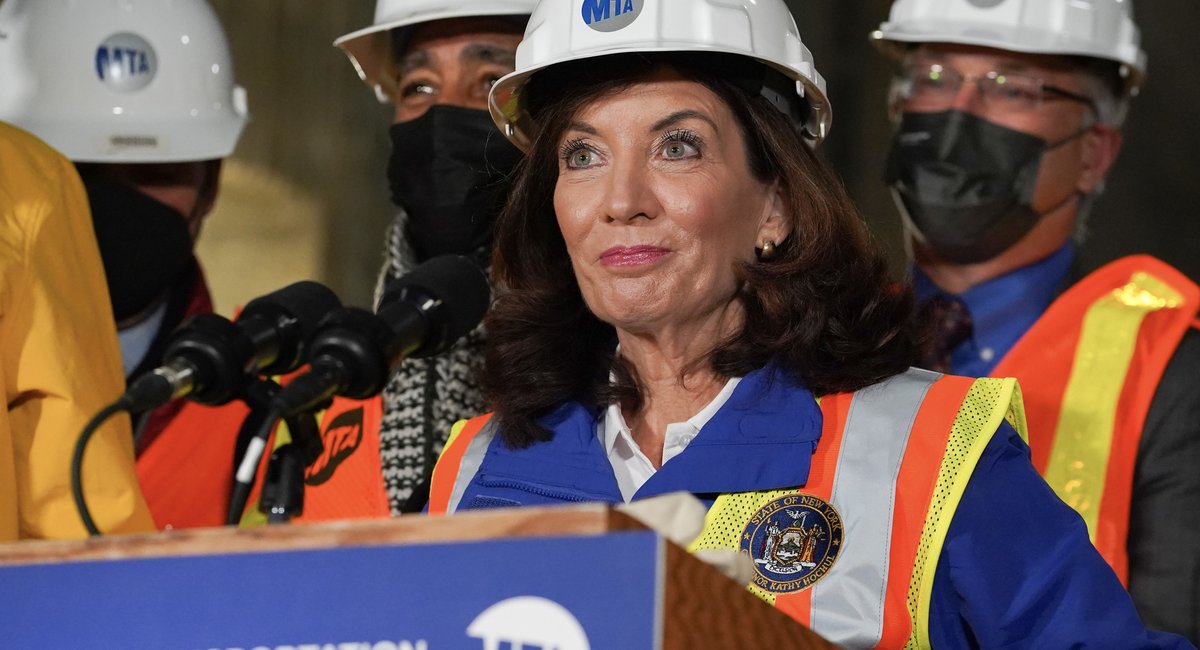Middle Eastern and North African business leaders in New York say they are looking to a future of expanded economic opportunities under state legislation that would create a separate racial category for members of those groups on government forms, in research and potentially in contracting.
They’re just waiting for Gov. Kathy Hochul to weigh in.
“I think this is going to be a game-changer for so many Arab American business owners,” said Debbie Almontaser, cofounder of the Yemeni American Merchants Association and CEO of Bridging Cultures Group.
For decades, Middle Eastern and North African people have been classified as “white” in most official government forms and research, notwithstanding their different lived experiences. A bill awaiting Hochul’s signature would create a separate racial category for the two groups, known by the shorthand MENA, potentially opening the door to otherwise inaccessible business opportunities.
Backers of the change say it could eventually give members of those communities access to certification as Minority and Women Owned Business Enterprises, or MWBEs. The certification gives businesses preferred access to some government contracts.
Kristin Devoe, a spokesperson for Hochul, said the Democratic governor will review the MENA legislation, which passed the state Legislature in June.
If Hochul does sign the bill, access to MWBE contracts would not be automatic but would require further legislative action, according to the Empire State Development office, which oversees economic development across the state.
A spokesperson for office, Emily Mijatovic, said it does not comment on pending legislation. MWBEs secured $2.8 billion in state business in the fiscal year ending in 2023 and a total of $8.7 billion since 2021, according to the agency.
The state figure was dwarfed by MWBE business with New York City’s government, which was more than $6 billion in 2023 alone.
“That puts us well on our way to hitting our ambitious goal of $25 billion awarded to MWBEs by 2026,” Mayor Eric Adams said at a city procurement fair last October, noting that the program facilitates “a more equitable business landscape.”
State Assemblymember Jessica González-Rojas, a Democrat from Queens who sponsored the MENA legislation, urged the governor to sign her bill.
“The misclassification of Middle Eastern and North African (MENA) communities as white blocks many from accessing assistance and programs such as MWBE status,” said González-Rojas in a statement. “New Yorkers like my neighbors in Astoria and neighborhoods in Brooklyn and other parts of our city do not benefit from the same economic privilege as white New Yorkers and it is incumbent on us to correct this erasure.”
She said in an earlier interview that “disaggregating the white category to identify the MENA population … will remove certain barriers and allow much-needed resources to reach these residents.”
Rana Abdelhamid, executive director of Malikah, a Queens-based anti-violence organization for women and girls, said a coalition of groups had been in regular conversation with the governor’s liaisons.
“Unfortunately, at this moment, it has not been made a priority, but we’re continuing to push because we know that it is a priority for our community,” Abdelhamid said.
Almontaser, whose company provides translation services, food contracts and services for migrants, said she was “excited” by the prospect of the MENA classification.
“Arab Americans have been considered white, Caucasians — and sadly, though we’ve been considered as that, we’ve had zero privilege,” she said. “And we have experienced discrimination and bias whether it’s housing, whether it’s business, because we are minorities.”
Youssef Mubarez is president of YAMA Action, a political organization that advocates for Yemeni Americans in New York, and an executive at ATM World Corp., which provides point-of-sale machines and credit card terminals to businesses across the country. His Mokafé chain of Yemeni coffee shops now has locations in Queens, Brooklyn and Paterson, New Jersey.
Now 36, he was 13 at the time of the 9/11 terrorist attacks. “There’s a whole decade where the only thing we wanted to do or our parents want to do is hide our identity in a sense, because of fear of backlash,” he said.
In recent years, Mubarez said, Yemeni-run businesses have thrived across the city, including delis, bakeries and restaurants. But they’ve remained cut off from lucrative opportunities, such as the ongoing $19 billion renovation of JFK Airport, he added.
“They’re not going to get approved or even considered, because the ones at the top of the list are MWBE-certified,” said Mubarez.
He said YAMA Action has reached out to Hochul’s office on multiple occasions in recent weeks about the MENA legislation. “They’re all saying the same thing,” he noted. “Like, ‘Yeah, we’re putting it on our radar.’ She just has a huge list of bills that she has to get to.”
